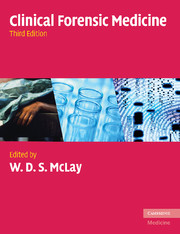Book contents
- Frontmatter
- Contents
- List of contributors
- Preface
- 1 Legal systems: a world view
- 2 Scottish legal system
- 3 The Police in the United Kingdom
- 4 The practitioner's obligations
- 5 The doctor in court
- 6 Custody medicine: physical conditions
- 7 Custody medicine: mental illness and psychological conditions
- 8 Substance misuse
- 9 Alcohol, drugs and driving
- 10 Injury
- 11 Child abuse: physical
- 12 Child abuse: sexual
- 13 Adult sexual offences
- 14 Management of at-risk exposures and infection control in custody
- 15 Scenes of crime
- 16 Forensic science
- 17 Forensic dentistry
- 18 Investigation of death
- 19 Dealing with a major disaster
- 20 Occupational health of police officers
- Index
- References
4 - The practitioner's obligations
Published online by Cambridge University Press: 12 August 2009
- Frontmatter
- Contents
- List of contributors
- Preface
- 1 Legal systems: a world view
- 2 Scottish legal system
- 3 The Police in the United Kingdom
- 4 The practitioner's obligations
- 5 The doctor in court
- 6 Custody medicine: physical conditions
- 7 Custody medicine: mental illness and psychological conditions
- 8 Substance misuse
- 9 Alcohol, drugs and driving
- 10 Injury
- 11 Child abuse: physical
- 12 Child abuse: sexual
- 13 Adult sexual offences
- 14 Management of at-risk exposures and infection control in custody
- 15 Scenes of crime
- 16 Forensic science
- 17 Forensic dentistry
- 18 Investigation of death
- 19 Dealing with a major disaster
- 20 Occupational health of police officers
- Index
- References
Summary
Introduction
A forensic physician is called upon to undertake examinations in a wide variety of situations. Most people examined will be alive, and will therefore have certain rights, such as a right of confidentiality, and capabilities, which will include the capacity to give consent. It is the responsibility of the examining doctor to consider, in the individual case, where the boundaries lie among the (often conflicting) rights of the person examined, the processes of investigation and the interests of justice.
This chapter aims to define the responsibilities of the forensic physician solely in an ethical context. In dealing with the individual case, many of the ethical considerations outlined here will be modified. Some may even be discarded. It is essential, however, for the clinician to be aware of broad principles, so that he/she can decide how closely he/she wishes to adhere to them. He/she will need to bear in mind that to depart from them without good reason may invite the interests of the General Medical Council (GMC), and of the civil or criminal courts. The ultimate test of any action is whether the doctor is able to justify it to his/her peers.
Ethical principles define an accepted code of behaviour within a particular group, the group in this case being the medical profession. Ethical standards are not the same as moral standards, which represent principles accepted more widely within society.
- Type
- Chapter
- Information
- Clinical Forensic Medicine , pp. 33 - 44Publisher: Cambridge University PressPrint publication year: 2009

